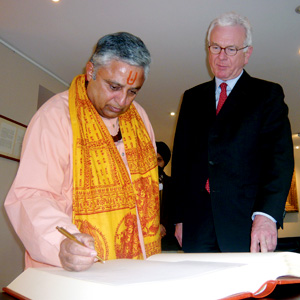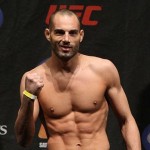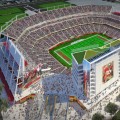A Buddhist, a rabbi and a Hindu walk into a city council meeting and each say a prayer É unless they’re in Santa Clara.
Unfortunately, this isn’t a joke. Three religious leaders from Reno, Nev., have joined forces to call on the Santa Clara City Council to start using multifaith prayers to open meetings. For the past 25 years, an annually appointed councilmember opens the city’s bimonthly council meetings with the following invocation:
“Oh heavenly father on high, we humbly seek thy blessings upon this meeting. Grant us strength, courage and will to perform our obligations and duties to our people with justice to all. Grant us wisdom so that we may act wisely and for the best interests of our people, our neighbors and our country. All this we ask in thy name, who reigns the world without end.”
In late May, Hindu statesman Rajan Zed asked Santa Clara city officials if he could open a council meeting with a Hindu invocation. The city denied the request. Zed then asked if a councilmember would read a Hindu invocation that he submitted. The city also denied this request.
In late July, Zed asked for the support of two fellow religious readers active in the interfaith community: Rabbi ElizaBeth W. Beyer and the Reverend Jikai’ Phil Bryan, a Buddhist. Zed’s goal was to start Santa Clara City Council meetings with a rotation of prayers representing major religions and Native American spirituality.
While this is the first time Zed has spearheaded a request of this nature, he routinely asks government entities to open meetings with a Hindu prayer.
“The purpose is to create dialogue,” Zed says. “With dialogue we can break down prejudices.”
He adds that people often don’t know much about Hinduism and that the prayer is a way to educate people about the religion. He often takes a copy of the scripture with him, which is why he was surprised when he was rebuffed.
“I have never received a ‘no’ except from Santa Clara,” Zed says “Usually people are very warm and welcoming.”
Zed has delivered Hindu prayers on state senate and assembly floors. He also gave the first Hindu opening prayer in the U.S. Senate on July 12, 2007, as a guest chaplain. Three members of a fundamentalist Christian organization initially shouted him down during the prayer, calling it “an abomination” and asking God to “forgive our nation.” They were later arrested by the Capitol police and charged with a misdemeanor for disrupting Congress.
Following the removal of the protesters, Zed proceeded with his prayer, asking senators to “strive constantly to serve the welfare of the world” and that their work be “guided by compassion and without thought for themselves.”
Zed has gone on to open almost all the city and county government meetings in Nevada that traditionally open with a prayer. He has continued this work in California by contacting city and county boards that traditionally open with a prayer. Zed drives from Reno to these meetings, sometimes spending an entire day in the car to arrive at his destination.
Aside from Santa Clara, only one other California city—Paradise—has a tradition in which one appointed councilmember reads the invocation. For this reason, the Paradise City Council denied Zed’s request to come do an invocation, but the council did agree to read one that he provided.
Zed says that the call for the Santa Clara City Council to do a rotation of prayers is due to the fact that religious individuals like himself can neither give a different invocation nor provide one to be read, as was done in Paradise.
“They don’t let other people play,” he says.
Santa Clara’s Public Communications Manager, Dan Beerman, says that the city does not have plans to change the existing invocation setup, but it “doesn’t mean we’re closed to it.”
There is no formal process to change the tradition surrounding the invocation prayer, Beerman says. He adds that he is not aware of any similar requests. But there are ways in which the issue of prayer can be brought before the city. Beerman suggested writing letters to the city manager, Ron Garratt, or Mayor Jamie Matthews and the council.
Another option would be addressing the City Council during the public presentations portion of meetings. Public presentations are not limited to residents of Santa Clara. But Zed says he does not plan on addressing the council, which returns to session in the third week of August, in this way.
Rabbi Beyer, who met Zed and the Rev. Jikai’ Phil Bryan in her interfaith work, says that she also doesn’t intend to address the council. She hopes that the issues “may be brought to the attention of local groups,” and would defer to religious leaders in Santa Clara.
“I have no interest in making this adversarial,” Beyer says. “We want to help and support those in government.” She emphasizes that the call for rotational prayers is about providing a new perspective.
Regardless of what religion a prayer represents, some people find the mere existence of an invocation prayer troubling. Zed admits that citizens sometimes aren’t aware that their council meetings have an invocation prayer. When local media outlets have publicized his guest appearances, some people have protested the fact that there is an invocation prayer, irrespective of what religion it represents.
Santa Clara University law professor Bradley Joondeph explains that the government cannot act in a way that “endorses” one religion over others, or endorses religiosity over agnosticism or atheism. It can, however, act in ways that recognize the importance of religion to its citizens.
“The line between the two, needless to say, is hardly clear,” Joondeph adds.
The three religious leaders’ request of Santa Clara purposefully did not say which major religions should be represented in a rotation of prayers. For Zed, the specific religions and rotation schedule is not important. He says it could be very informal. For him, the issue is “having a prayer is better than having no prayer.” Zed says it is important to pray for the prosperity and the good of a city because “[government] meetings are challenging.”
“When we think of a higher power before meetings, there are fewer differences, more cohesiveness, and we become more humble,” he adds.
Joondeph says that difficulties arise if the government allows some religions to be represented in an invocation, because some will necessarily be excluded.
“That begins to look like an endorsement of some sort,” he explains. “At the same time, this does not mean the city, once it decides to have an invocation, is then somehow obligated to represent all 1,000 religions practiced in the Bay Area. Again, where the line falls, exactly, is really unclear. I think [the city] could quite reasonably decide that there shall be no such invocations at all.”

 Chick-fil-A Protests Reach Silicon Valley
Chick-fil-A Protests Reach Silicon Valley  San Jose MMA Fighter Swick Returns to Octogon
San Jose MMA Fighter Swick Returns to Octogon 
